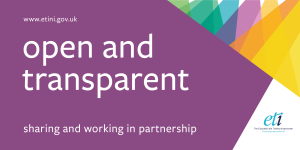
In being open and transparent, the Education and Training Inspectorate:
- Provides guidance for schools. This guidance describes the main activities undertaken during inspection.
- Shares its Inspection and Self Evaluation Framework known as the ISEF. The ISEF outlines the areas under evaluation together with characteristics of effective practice and challenge questions to support self-evaluation.
- Carries out a pre-inspection visit during full inspection of a school; this provides an opportunity to outline the inspection process and answer any questions.
- Invites the school to identify a senior member of staff to undertake the role of representative on full inspections; typically, this will be the principal. Undertaking this role provides an opportunity to: attend daily meetings with the inspectors; hear, first-hand, emerging inspection findings; sign-post sources of additional evidence to the inspectors; and, attend the final moderation meeting when performance levels and the overall effectiveness conclusions are agreed.
- Offers the opportunity for joint lesson observations to promote a common understanding of what constitutes good or better learning and teaching.
- Usually has an associate assessor, who is a serving practitioner from another school, on the inspection team.
- Provides an oral report back at the end of the inspection. During the oral report back, questions can be asked and inspection findings can be clarified.
- Publishes inspection reports, containing a summary of the key findings, on the Education and Training Inspectorate’s website. Inspection reports on the quality of education are available to the school community and the wider public.
- Welcomes feedback from staff. School staff can complete a confidential online post-inspection survey that is administered independently by the Northern Ireland Statistics and Research Agency. The Education and Training Inspectorate use the outcomes of this survey to inform the ongoing review and development of inspection.